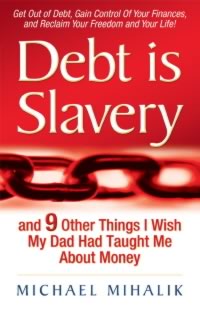Understanding the seven habits of wealth
We are what we repeatedly do. Excellence then, is not an act, but a habit. — Aristotle
We tend to define our lives by the big events: graduation, marriage, children, a big promotion, retirement. What often gets neglected are the little things we do every day, the little things that make the big events possible. As Aristotle said, it's what we "repeatedly do" that produces excellence. When it comes to money and wealth, what do you repeatedly do?
Financial security cannot be reduced to a simple formula. Like excellence, it is the result of your daily habits. An individual with high income who has poor daily habits will fail to find financial security. But a person with relatively low income can achieve financial freedom through the power of good habits. So what are the habits of wealth? Continue reading...
What is financial security?
 Wouldn't it be great to be financially secure — to never have to worry about money?
Wouldn't it be great to be financially secure — to never have to worry about money?
What would it take to get there? In fact, what exactly is financial security?
Ask ten people to define how much money it takes to attain financial security and you will probably get ten different answers. For some people, financial security is having $10 million in the bank. For others, it's $50 million. Continue reading...
Three Questions About Money and Ethics
Lady Kemma recently wrote with a question about money and ethics:
Last week I went out with my work department. After feeding 30 people, all with individual checks, I left the harried waitress a generous tip. My colleague said, "You're leaving too much tip." I said, "The poor lady earned it." I left the money on the cash tray and got up to leave. My colleague proceeded to take some of the money off my cash tray and put it in her pocket. Since I only have to deal with this lady once a year, I let it go. Thoughts?
Dilemmas like this fascinate me. There are so many things going on at once, it's difficult to make a smart decision on the spot. I like to think I would have challenged my colleague — I've waited tables, and if I leave a tip for someone, nobody had better touch it. On the other hand, I'm often afraid to make a scene, so maybe I would have kept my mouth shut. I don't know. Just two hours after Lady Kemma sent her question, Kris and I faced a similar situation, but in reverse. Continue reading...
Getting to now: How to beat the procrastination habit
I am a procrastinator. I always have been. It's a character flaw, and I admit it. I've tried all sorts of things to beat the habit — Getting Things Done, e-mail reminders, dozens of list systems — but the only thing that seems to work is to:
Do it now.
This is blindingly obvious, I know, but many people lose sight of this fundamental skill. It's not that we don't know that we should do things now; it's that we've forgotten how. Here are some techniques I've been using to try to force myself to get to now:
 Set aside blocks of time to do things
Set aside blocks of time to do things
When I was talking with my wellness coach earlier this year, she asked me why I didn't exercise more often. "I don't have the time," I said. "Something always comes up." She wasn't impressed. "J.D.," she said. "You have to make time. Make an appointment with yourself to run or to go for a bike ride." The same principle applies to other things you might procrastinate. Kris and I used to schedule a block of time on Saturday morning specifically to clean the house. Each week we'd tackle a different room. If we didn't do this, I'd just put it off for weeks (or months). Pick an hour a day to get things done.
What if the Stock Market Makes You Nervous?
A couple of readers have mentioned that they're nervous about the stock market's recent volatility. I've read similar concerns on other blogs and financial news sites. People are worried that the stock market's performance over the last month portends an impending bear market, and they don't know what to do.
Reading these concerns reminded me of Why Smart People Make Big Money Mistakes, which I reviewed last week. In the book, the authors discuss panic selling as a common financial pitfall. When people suffer from loss aversion, short-term losses cause them to sell investments prematurely, which can lead to greater pain:
One of the most obvious and important areas in which loss aversion skews judgment is in investing. In the short term, being especially sensitive to losses contributes to the panic selling that accompanies stock market crashes. The Dow Jones Industrial Average tumbles (along with stock prices and mutual fund shares in general), and the pain of these losses makes many investors overreact: the injured want to stop the bleeding. The problem, of course, is that pulling your money out of the stock market on such a willy-nilly basis leaves you vulnerable to a different sort of pain — the pangs you'll feel when stock prices rise while you're licking your wounds. Continue reading...
Why Smart People Make Big Money Mistakes (and How to Correct Them)
Continue reading...Money is more about mind than it is about math — that’s one of the key tenets of this site. People make financial decisions based not on mathematical ideals, but on emotion.
There’s actually a branch of economics called behavioral finance devoted exclusively to this phenomenon, exploring the interplay between economic theory and psychological reality.
On a recent train ride across Ireland, I read a book on behavioral economics called Why Smart People Make Big Money Mistakes (and How to Fix Them), which was published in 1999 by Gary Belsky, a former writer at Money magazine, and Thomas Gilovich, a psychology professor at Cornell University. In this short book, Belsky and Gilovich catalog a menagerie of mental mistakes that cause people to spend more than they should. What might have been a boring topic becomes fascinating thanks to an engaging style and plenty of anecdotes and examples. This book covers a couple dozen psychological barriers to wealth. I’m going to highlight just a few.
For example, do you treat “found money” — gifts from grandparents, tax refunds — differently than you do the money you earn from working? If so, you’re guilty of mental accounting, and it’s probably costing you. If you’re tempted to take money out of stocks when the overall market drops, you suffer from loss aversion, and overcoming it will allow you to earn more from your investments.
I've always been a packrat. When I was a boy, I had a closet that my parents called my "rat's nest". I stashed anything I could find in there. As I grew older and began to earn money, my urge to possess things became a compulsion: I bought tapes and records and books and clothes and comics. I would buy anything that seemed like a bargain. (I often bought on credit, of course.) I used to have a stack of Costco clothes in my closet that I'd never worn. I once brought home six boxes of free books from a bookstore's "going out of business" sale. These books may not have cost me any money, but I now realize that they weren't exactly "free".
How does this relate to my trip to Europe?
More about...PsychologyYou Are Your Own Worst Enemy
My friend Gillian called the other day — she's been having money trouble and was looking for help. "I'm not really a financial advisor," I told her. "I write about money, and I try to help people at my website, but I'm not qualified to coach you one-on-one." Still, she's a friend, so I resolved to at least give her some advice. I asked her to explain the situation.
"Tom and I are working all the time, but we're always broke. He just wrecked his car, but we don't have money to get it repaired. We'll have to use the credit cards again. We don't have any other choice. There's never anything left at the end of the month," she said. "I need some help budgeting so that we don't keep having this problem."
"Well, let's see what we can do. I guess the best place to start is with your monthly income and your monthly expenses. How much do you and Tom bring home each month?" I asked. Continue reading...
The power of yes: A simple way to get more out of life
Continue reading...For much of my adult life I've been shackled by fear. I've been afraid to try new things, afraid to meet new people, afraid of doing anything that might lead to failure. This fear confined me to a narrow comfort zone. Recently, however, I made a single small change that has helped me to overcome my fear, and allowed me to get more out of life.
Last fall somebody at Ask Metafilter posted a question looking for books about self-confidence. One person recommended Impro by Keith Johnstone. Intrigued, I borrowed it from the public library. It blew my mind. Though it's a book about stage-acting, several of the techniques it describes are applicable to everyday life.
I was particularly struck by the need for improvisational actors to accept whatever is offered to them on stage. In order for a scene to flow, an actor must take whatever situation arises and just go with it. (Watch old episodes of Whose Line is It Anyway to see this principle in action.) Johnstone writes:
More about...PsychologyThe problem with the bank of mom and dad
Continue reading...An anonymous poster at AskMetafilter wonders should parents finance grad school?
Should parents help their children pay for grad school if they can afford it? My parents are divorced, but both are in households considered in the top 1% of the US in terms of income and net worth. After limited financial assistance from them during undergrad, I am getting no help at all for grad school. Am I out of line to expect that I should?
The discussion at AskMetafilter features some outstanding comments, most of which note that "no, you shouldn't expect your parents to help". But what do the financial experts say?
More about...Psychology